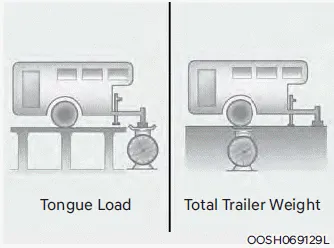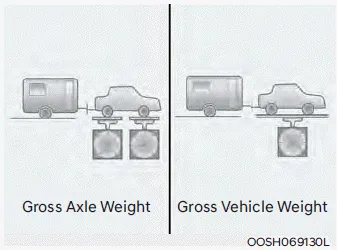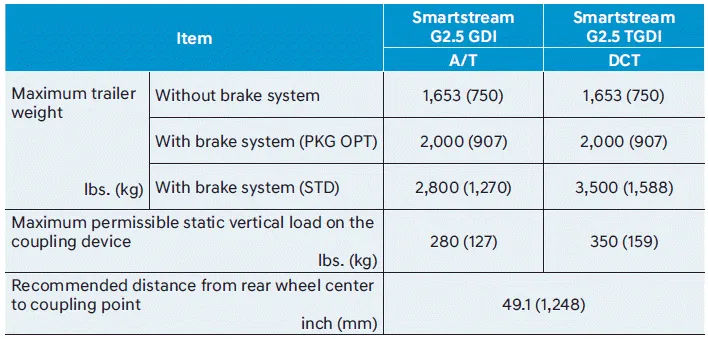Hyundai Santa Fe (TM): Trailer towing / If you decide to pull a trailer?
Here are some important points if you decide to pull a trailer:
- Consider using a sway control. You can ask a trailer hitch dealer about sway control.
- Do not do any towing with your vehicle during its first 1,200 miles (2,000 km) in order to allow the engine to properly break in. Failure to heed this caution may result in serious engine or transmission damage.
- When towing a trailer, consult an authorized HYUNDAI dealer for further information on additional requirements such as a towing kit, etc.
- Always drive your vehicle at a moderate speed (less than 60 mph (100 km/h)) or posted towing speed limit.
- On a long uphill grade, do not exceed 45 mph (70 km/h) or the posted towing speed limit, whichever is lower.
- Carefully observe the weight and load limits provided in the following pages.
Trailer weight

What is the maximum safe weight of a trailer? It should never weigh more than the maximum trailer weight with trailer brakes. But even that can be too heavy. It depends on how you plan to use your trailer. For example, speed, altitude, road grades, outside temperature and how often your vehicle is used to pull a trailer are all important. The ideal trailer weight can also depend on any special equipment that you have on your vehicle.
Tongue load

The tongue load is an important weight to measure because it affects the total Gross Vehicle Weight (GVW) of your vehicle. The trailer tongue should weigh a maximum of 10% of the total loaded trailer weight, within the limits of the maximum trailer tongue load permissible.
After you’ve loaded your trailer, weigh the trailer and then the tongue, separately, to see if the weights are proper. If they aren’t, you may be able to correct them simply by moving some items around in the trailer.
WARNING
Take the following precautions:
- Never load a trailer with more weight in the rear than in the front. The front should be loaded with approximately 60% of the total trailer load; the rear should be loaded with approximately 40% of the total trailer load.
- Never exceed the maximum weight limits of the trailer or trailer towing equipment. Improper loading can result in damage to your vehicle and/ or personal injury. Check weights and loading at a commercial scale or highway patrol office equipped with scales.
Information
With increasing altitude the engine performance decreases. From 1,000 m above sea level and for every 1,000 m thereafter 10% of vehicle/trailer weight (trailer weighter + gross vehicle weight) must be deducted.
Reference weight and distance when towing a trailer

If you are considering to tow with your vehicle, you should first know your country’s legal requirements. As laws vary the requirements for towing trailers, cars, or other types of vehicles or apparatus may differ.
Hitches Information The mounting hole for hitches are located on both sides of the underbody behind the rear tires. It’s important to have the correct hitch equipment.
Other information:
Hyundai Santa Fe (TM) 2019-2023 Service and Repair Manual: Front Radar Unit. Repair procedures
Inspection Inspection procedure for vehicle with Forward Collision-Avoidance Assist and Smart Cruise Control system failure 1. Check the bumper appearance for accident (check the vehicle appearance visually and see bumper replacement history).
Hyundai Santa Fe (TM) 2019-2023 Service and Repair Manual: Cruise Control (CC) Switch. Components and components location
Categories
- Manuals Home
- Hyundai Santa Fe Owners Manual
- Hyundai Santa Fe Service Manual
- Driver assistance system
- Front Wiper Motor. Components and components location
- Fender Garnish. Repair procedures
- New on site
- Most important about car
